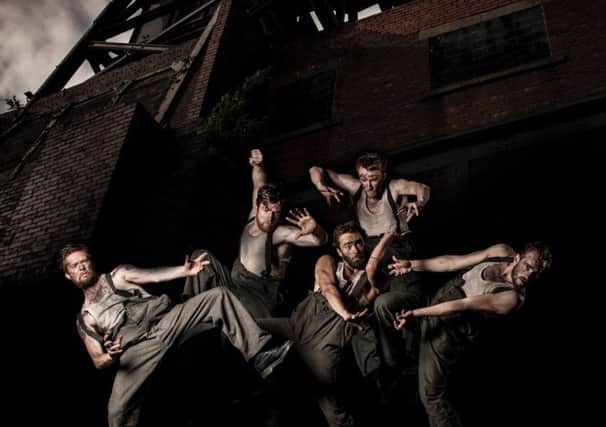Strictly pithead: Grimethorpe - The Musical


“I grew up in the mining village of Grimethorpe,” says Clarke, who in recent years has been making a name for himself as a choreographer. “As a kid I was surrounded by the coalfields and they left a deep impression. I remember the miners’ galas, I remember seeing the men walking to and from the pit every day and I remember when they stopped.”
When the year-long strike began in 1984 almost half of Grimethorpe’s adult population worked down the pit. By the early years of the following decade just a handful called themselves miners. Most had no work at all. The dismantling of the coal industry left deep scars on the village. As the 80s gave way to the 90s, Grimethorpe was exempt from the wave of Cool Britannia that swept the rest of the county.
Advertisement
Hide AdAdvertisement
Hide AdInstead a European Union study declared it the poorest village in the country and among the poorest in Europe. Levels of crime and drug abuse had soared and for years unemployment was above 50 per cent.
“It was a scandal,” says Clarke, who trained initially at the Northern School of Contemporary Dance. “Grimethorpe was built around the mine. When the pits closed that was it. Its lifeline was cut off. Nothing came in its place and lives began to unravel. Suddenly this hardworking mining village had nothing to get up in the morning for. It was eight miles from the nearest town. That didn’t matter when the pit was open, but when it went it people felt isolated. For some the only escape was through drugs and alcohol.”
Clarke also found an escape route and “ran off to London to be an artist”. He might well have stayed. There are after all more opportunities for a choreographer in the capital than Grimethorpe, but after 10 years in the South he felt the pull of home. Having moved back to his childhood village, surrounded by the people he had grown up with, it was perhaps inevitable that Clarke decided to plunder his own past for a show which he says “explores the dark underbelly of the mining industry”.
COAL got its preview last year and following a few tweaks and additions is now on tour around the region.
Advertisement
Hide AdAdvertisement
Hide Ad“It’s basically a day in the life of the coal industry,” says Clarke. “When I moved back here, the place had changed, but the one thing which hadn’t was the spirit of the people. They are still passionate about this place and they are rightly still proud of how they behaved in the face of a government which was determined to airbrush them out of history. I was only very young when the strike happened, but I have very vivid memories of that time and now I am in a position to help Grimethorpe tell its story.”
As part of his research, Clarke carried out extensive interviews with Anne Scargill and Betty Cook, founders of Women Against Pit Closures, and spent time with those who had seen the strike from the picket lines. “The result is a day in the life of the coal industry,” he says. “It tells of the highs, but it also doesn’t shy away from the lows. The last thing I wanted to do was to glamorise the industry. These guys worked in incredibly oppressive conditions. They spent hours breathing in coal dust and while the pits were held together with pride and determination, a lot of miners hoped their sons would find a different way to earn a living. They didn’t want them to become human machines.
“Anne and Betty are pretty formidable characters and during the 1980s their lives changed completely. While the strike brought many men to their knees, for many of their wives and girlfriends it was incredibly liberating. They suddenly found a voice they hadn’t had before. There weren’t many good things to come out of the strike, but that was one of them.”
To lend an air of authenticity to the piece, a small section of each show is performed by ordinary women who have some link to the mining industry and the music is provided by a brass band.
Advertisement
Hide AdAdvertisement
Hide Ad“None of the women are trained dancers, but they have been brilliant. Some of them have told me the whole experience has been life-changing. That means a huge amount because that’s what this piece is all about. If I’m honest when I first started thinking about putting this show together, I wasn’t entirely sure what the reaction would be, but it’s been beyond anything I could have hoped for.
“When we did the previews, we were expecting 90 people to turn up. In the end, there were more than 300. The miners and their families came in their droves and that’s hugely gratifying. There’s a stereotype that says miners won’t get dance, but that’s just nonsense. There was a real rhythm to life of the pits and I hope that’s what we’re able to capture on stage. When we set out on this journey, the only thing I wanted to do was say to people, ‘Look, here is a chapter of British history that we all need to remember’. It’s about ordinary people who fought for what they believed in. They might not have won, but that didn’t mean that they shouldn’t have fought. If we could all just have a fraction of their determination then the world would be a much better place.”
• COAL, Barnsley Civic, tonight, 01226 327000, tickets.barnsleycivic.co.uk; Cast, Doncaster, March 5, 01302 303959, doncasterticketoffice.co.uk.